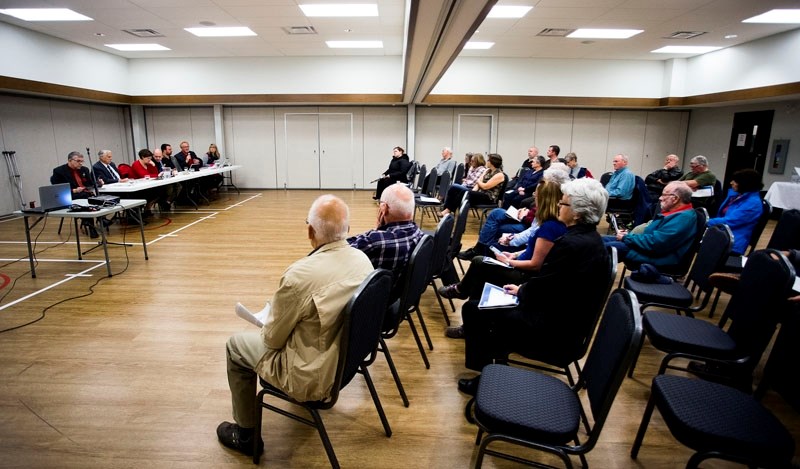Major capital projects, hiring new staff and policing were the most common concerns that St. Albert residents raised at a public forum this week.
About 30 residents came out to Red Willow Place Thursday evening to ask questions – and voice opinions – about the city’s proposed 2017 budget. All seven council members and interim city manager Chris Jardine were on hand to address questions and concerns.
The preliminary budget document, which Jardine presented to council Oct. 24, includes a 3.1-per-cent property tax increase to cover increased operating costs, including 19 new full-time staff positions.
That tax hike could increase an additional 0.3 per cent in the first year and 2.1 per cent in subsequent years if council approves borrowing $11 million to make up a shortfall in the capital budget.
The most common topic of questions was the three major capital projects the city has tentatively planned: a new branch library, a new ice arena and a new aquatics facility. The library and arena are slated for preliminary work in 2017, while the swimming pool is slated for preliminary work in 2018.
One resident asked for clarifications on what building all three projects might cost – factoring in payments on the borrowing as well as the additional operating costs, and Jardine confirmed moving forward with the library and arena projects would need additional tax increases in future years.
“It’s about a 5.4-per-cent tax increase combined for the two,” he said.
Other residents appeared unconcerned about the cost, seeking confirmation the projects would in fact be moving ahead.
“I don’t think there’s any such thing as a fait accompli,” said Coun. Tim Osborne, who also sits on the library board. “But the projects are in the budget right now.”
Others suggested borrowing for the projects might not get public support, that examining other options for locating the projects may ultimately save money, and that the projects should be built in stages to minimize year-over-year tax increases.
Jardine said in the long term, council will have some tough decisions to make to make ends meet on all the capital projects the city has planned – over the next 10 years, the funding shortfall for all planned projects is $310 million.
“It’s a challenge,” he said. “The funding doesn’t go as far as the projects we have on the books.”
Another major concern residents expressed is the fact this budget includes 19 new full-time equivalent staff positions, which several said was fairly high.
Former councillor Malcolm Parker asked whether administration could make do by combining some of the roles for existing staff, but was told it wasn’t feasible.
“We don’t just add staff without thinking about how things are aligned,” Jardine said. “What we put forward is what we need.”
He explained last year’s budget included just four additional new staff members, which wasn’t enough, and this year’s ask is essentially playing “catch up.”
Mayor Nolan Crouse said on average, municipalities in Alberta have 10 employees per 1,000 residents, and with about 620 staff for about 62,0000 residents, St. Albert is on par.
Resident William Tuchak said since the ratio Crouse quoted did not include contractors, it has little real meaning.
“The number you quoted is an airy fairy number,” he said.
“That’s a fair comment,” Crouse replied.
Several residents also expressed concerns about crime, and suggested the city should look to do more to increase patrols and reduce crime.
Coun. Bob Russell said the hiring of three new police officers, as well as the creation of a policing committee bylaw for which he has strongly advocated, would help address that issue. He conceded the city did not have the authority to specifically direct patrols at certain places and at certain times, but argued an advisory group could nonetheless help highlight priorities.
“We can raise these concerns,” he said.
Two residents spoke in support of affordable housing, and in particular the St. Albert affordable housing society, and of seeing the city continue to help fund local projects. Crouse replied it’s unusual for cities to directly fund affordable housing operating costs, and in the future funding from the province would be directed through the local housing foundations. In St. Albert, the Sturgeon Foundation is responsible for seniors and affordable housing.
Another resident asked about providing transit service in-house instead of through a contract. Coun. Wes Brodhead said every time the issue comes up the merits of providing the service in-house are considered, but the economic case is always made to contract instead.
Two residents also raised concerns about the value of the services the city provides in return for the tax dollars. One suggested snow removal in particular has been an issue. Another suggested her family struggled to afford recreation in the city and with an annual family income of $120,000, they still had to live paycheque to paycheque.
The feedback councillors heard at the Nov. 3 meeting, as well as at another invite-only public consultation Nov. 2, will help inform budget deliberations over the next month. Five meetings are scheduled throughout November and early December to specifically discuss budget issues, and council is expected to give the budget final approval Dec. 12.
While some municipalities in the province don’t pass the budget until the new year, Crouse said he has never known that to be the case in St. Albert.
“I have every reason to believe we will pass a budget by Jan. 1,” he said.




